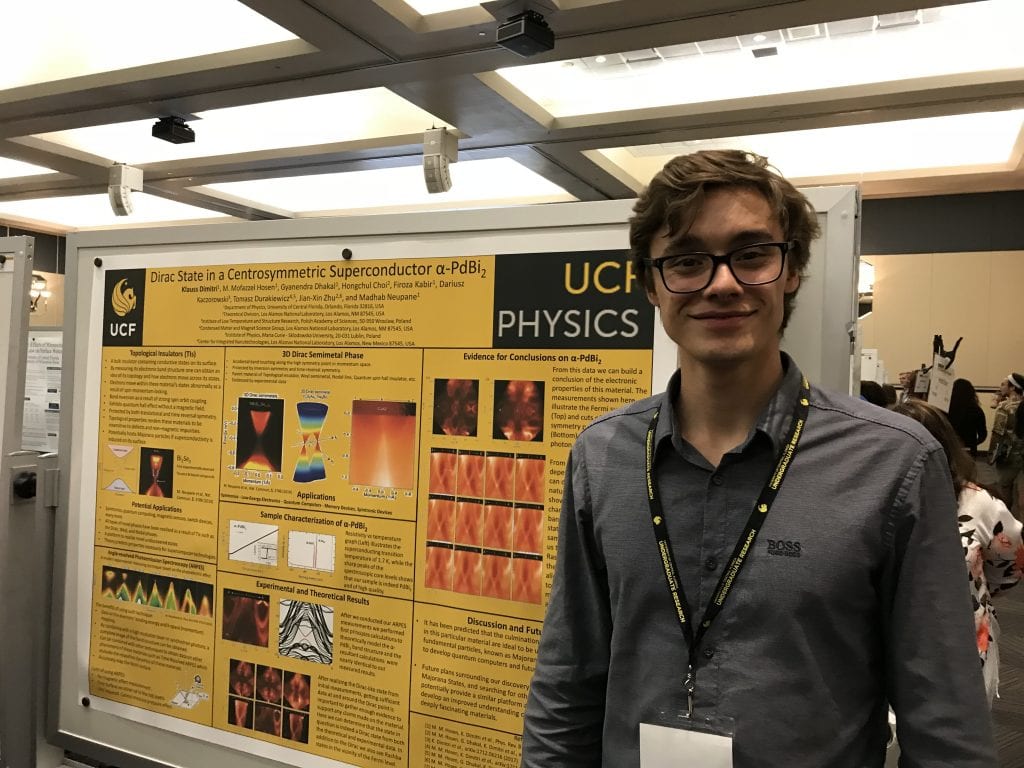Undergraduate Researcher Recognized for New Compound

Each spring, UCF hosts a Showcase of Undergraduate Research to celebrate students’ hard work uncovering new insights and ideas. This year, the Judge’s Choice Award for physical sciences went to Klauss Dimitri, a Physics and Aerospace Engineering double major. This first-place prize recognizes his research developing the materials needed to eventually create quantum computers.
“I was honored with UCF’s decision to acknowledge me with this grand award,” Dimitri said. “The research I presented is related to the development of materials that have the potential to play a part in shaping the technologies of tomorrow.”
The sought-after quantum computer would be able to process information millions of times faster than the fastest computers we have today. This could eventually lead to breakthroughs in almost every discipline, with computers able to calculate and compute algorithms that would have taken years to solve with current technology.
Dimitri’s research revolves around topological materials. These are compounds composed of different combinations of elements, the atoms of these elements consist of electrons that are typically sporadic and unordered. The combination of the two elements can create a pattern in the movement of the electrons and this electron pattern can be used to develop new technologies. Dimitri and his team were able to discover a specific compound where its unique electron pattern has the potential to establish important knowledge from which future technologies, such as quantum computers, can be built.
Dimitri’s presentation is a summary of his first author paper that was recently published in Physical Review B, a peer reviewed scientific journal from the American Physical Society that focuses on condensed matter and material physics. You can read his paper here.
“It is very motivating to have worked hard on a project, have it published, and be recognized by UCF for my efforts,” Dimitri said. “Not only does it reinforce that physics is the right path for me, but it also inspires me to work even harder on my future projects.”
This award recognizes not only the new compound he proposed at the Showcase, but also the culmination of time and hard work Dimitri put in to perfect his communication skills. As both a physicist and an engineer, he was afraid that locking himself in a room to think and solve problems would weaken his communication skills, so he decided to put himself into situations to improve his ability to adequately explain his work.
“Although I have great faith that my research is of great importance, I can’t help but think that this award also reflects my newly developed ability to communicate complex ideas,” he said. “This will stand as a major milestone not only for my career, but as a person.”
Dimitri spent hours tutoring his friends in physics and math to strengthen his communication skills, and applied to present at as many conferences as possible to gain exposure and practice. The more he presented, the more confident he became. The research team he’s part of also pushed him to develop a deeper understanding of and ability to explain physics and his ideas.
“I wouldn’t have dreamed of receiving such an award if it weren’t for the deeply helpful and positive atmosphere of our research group set by Dr. Madhab Neupane and his graduate students: Mofazzel Hosen, Gyanendra Dhakal, Firoza Kabir and Christopher Sims,” Dimitri said. “Ultimately, this award holds meaning for myself, but also for the team that supports me.”
The community of support surrounding Dimitri has always been strong. He originally became interested in engineering from spending time with his grandfather, a civil engineer in Brazil.
“Whenever I was able to spend time with him, he always enjoyed explaining how things work to me, building with me, teaching me the basics of circuits and explaining his solutions to problems in detail,” he said. “From those moments, in addition to my love for puzzles and riddles, my interest in science and math grew to the point where I could see myself having a life centered on those subjects.”
When he entered UCF, he soon found himself part of a second family, too. At one of the student yoga sessions, he met his girlfriend. He also found support from his mentor, Madhab Neupane, Ph.D., and his research team.
“Dr. Neupane has heavily supported me through every step of the way, from helping me become involved in research, create ideas, go to national labs, publish work and going to national and international conventions to present,” he said. “The team’s support rivals that of a loving family. I would not have been able to achieve a fraction of what I have done so far if it weren’t for UCF and the investment they make in their students.”
His foundation of support will be there as he continues growing as a student and a researcher. He hopes to complete his undergraduate degree, and then eventually go on to attain a doctorate in physics and ultimately become a professor.
“While I’m still in my undergraduate years, I have a goal of continuing the hard work with research while still having time to spend with friends and family,” Dimitri said. “With their support, as well as the department’s, I know it will only be a matter of time before I can truly realize my goals.”
